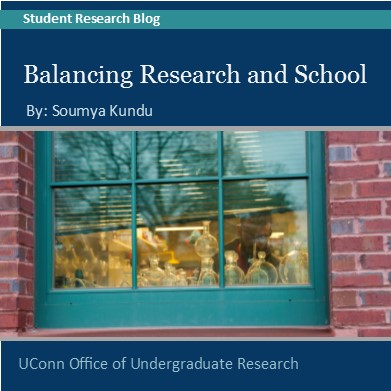 By: Soumya Kundu, OUR Peer Research Ambassador
By: Soumya Kundu, OUR Peer Research Ambassador
For me, summer has always been the most productive time for making progress on research. Without the regular worry of upcoming deadlines for coursework or responsibilities tied to extracurricular activities, I had the freedom to devote all of my attention to my research projects during the past two summers. However, summer doesn’t last forever, and often, work on the research project continues through the semester. Research during the semester can be much more challenging, especially if your plate is already full with classes and other commitments. If you find yourself in this situation, here are a few tips that can help you:
Treat your research work like a class:
Perhaps the best way to ensure that you will be incentivized to make progress on research in the face of mounting classwork during the semester is to turn your research work into an independent study project. Doing this provides numerous advantages. First, an independent study will allow you to formally set the number of hours you will be committing to your research every week, based on how many credits you sign up for. Formalizing this commitment will allow you to establish expectations with your advisor regarding the time you will be putting into your research during the semester. In addition, since the grade for such an independent study course will be assigned by your advisor, who will be evaluating you based on the work you have done throughout the semester, such an arrangement will motivate you even more to make progress on your project.
Incorporate your research into your coursework whenever possible:
From my experience in the computer science and engineering program at UConn, most of the upper level classes that you will elect to take in your junior and senior years might involve working on a project. In these cases, if the course aligns with your area of research, then a great option for the choice of the project might be something that can help you move your research forward. With the approval of the instructor, such a strategy can allow you to make as much progress on your research during the semester as possible and give you an opportunity to apply the material you are learning in class to your ongoing research project.
Focus on time management:
Your time during the course of a semester is extremely valuable. As the semester progresses, the demand for your time from different sources will keep going up while the time you can spare will increasingly diminish. In these scenarios, your ability to systematically lend out time to each activity that requires it will make the difference between smooth sailing and struggling to stay afloat. Therefore, the best course of action will be to create a plan where you devote a certain number of hours during designated days of the week to your research. This will help ensure that you are not pulling all-nighters before your lab presentation or weekly or monthly meetings with your advisor.
Set reasonable goals and create a plan:
At the beginning of each semester, you can easily overestimate how much work you can realistically accomplish for your research, especially if you’re coming on the heels of a very productive summer. This can create great disappointment for you when you might realize during the middle of the semester that you have fallen far short of your expectations as you are running from one class’s assignment to another. You can prevent this early on by recognizing the comparatively limited time you will have during the semester and setting your research goals accordingly. In fact, instead of setting a goal for what you wish to accomplish by the end of the semester first and then recursively figuring out what you must do to get there, try a more iterative approach: before the semester starts, or during the beginning of the semester, construct a weekly or monthly plan where you estimate what you can realistically accomplish by the end of each week or month. In that estimation, take into account the effect of factors like midterm week or other events you might know are coming up. Then, use this plan as a guide to both remind you of what you set out to accomplish and track your progress, and update it each week or month to reflect accomplished milestones and any change of plans.
One of the most important lessons that undergraduate research will teach you is the importance of staying organized and managing your time effectively, which are skills that will prepare you well for any career in the future. Effectively mastering these skills through your undergraduate research career will allow you to accomplish the most in the limited amount of time you’ll have during your undergraduate years.
Soumya Kundu is a senior majoring in Computer Science and Engineering, and minoring in Mathematics. Click here to learn more about Soumya.